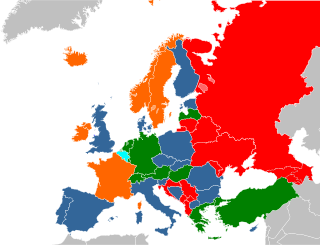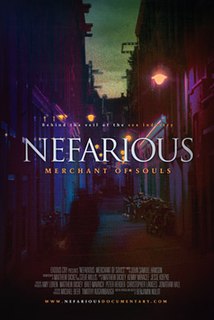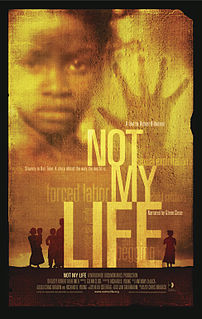
Sexual slavery and sexual exploitation is an attachment of any ownership right over one or more people with the intent of coercing or otherwise forcing them to engage in sexual activities. This includes forced labor, reducing a person to a servile status and sex trafficking persons, such as the sexual trafficking of children.

LGBT people in Bulgaria face legal challenges not experienced by non-LGBT residents. Both male and female same-sex relationships are legal in Bulgaria, but same-sex couples and households headed by same-sex couples are not eligible for the same legal protections available to opposite-sex couples. Discrimination on the basis of sexual orientation has been banned since 2004, with discrimination based on "gender change" being outlawed since 2015. In July 2019, a Bulgarian court recognized a same-sex marriage performed in France in a landmark ruling. For 2020, Bulgaria was ranked 37 of 49 European countries for LGBT rights protection by ILGA-Europe. Like most countries in Central and Eastern Europe, post-Communist Bulgaria holds socially conservative attitudes when it comes to such matters as homosexuality.

Sex trafficking is human trafficking for the purpose of sexual exploitation. It has been called a form of modern slavery because of the way victims are forced into sexual acts, usually non-consensually, in a form of sexual slavery. Perpetrators of the crime are called sex traffickers or pimps—people who manipulate victims to engage in various forms of commercial sex with paying customers. Sex traffickers use force, fraud, and coercion as they recruit, transport, and provide their victims as prostitutes. Sometimes victims are brought into a situation of dependency on their trafficker(s), financially or emotionally. Every aspect of sex trafficking is considered a crime, from acquisition to transportation and exploitation of victims. This includes any sexual exploitation of adults or minors, including child sex tourism (CST) and domestic minor sex trafficking (DMST).
Sex Slaves is a 2005 documentary film by Ric Esther Bienstock that was produced in association with CBC, Frontline (PBS), Channel 4 and Canal D.

Bulgaria joined the European Union in 2007, its compliance with human rights norms, however, is far from perfect. Although the media have a record of unbiased reporting, Bulgaria’s lack of specific legislation protecting the media from state interference is a theoretical weakness. Conditions in Bulgaria’s twelve aging and overcrowded prisons generally are poor. A probate reform in mid-2005 was expected to relieve prison overcrowding.
Forced prostitution, also known as involuntary prostitution or compulsory prostitution, is prostitution or sexual slavery that takes place as a result of coercion by a third party. The terms "forced prostitution" or "enforced prostitution" appear in international and humanitarian conventions, such as the Rome Statute of the International Criminal Court, but have been inconsistently applied. "Forced prostitution" refers to conditions of control over a person who is coerced by another to engage in sexual activity.
Prostitution in the Czech Republic is legal, but organized prostitution is prohibited. Ever since the Czechoslovak Velvet Revolution (1989) led to the creation of the two independent states Czech Republic and Slovakia, prostitution has been flourishing and has contributed its share to the region's booming tourist economy. Prostitution is widespread in Prague and areas near the Republic's western borders with Germany and Austria. In 2002, the Czech Statistical Bureau estimated the trade to be worth six billion crowns a year. UNAIDS estimate there are 13,000 prostitutes in the country. In Prague, the city's third district, immediately east of the center, is home to much of the city's sex industry.

Stephen Henderson Talbot is an American TV documentary producer, reporter, writer, and longtime contributor to the Public Broadcasting Service (PBS) and the series Frontline. His more than 40 documentaries include the Frontline films "The Best Campaign Money Can Buy", "Rush Limbaugh's America", "The Long March of Newt Gingrich", "Justice for Sale", and "News War: What's Happening to the News". Talbot has also written and produced PBS biographies of writers Dashiell Hammett, Beryl Markham, Ken Kesey, Carlos Fuentes, Maxine Hong Kingston and John Dos Passos. He was co-creator and executive producer of the PBS music specials, Sound Tracks: Music Without Borders".
Prostitution in Greece is legal at the age of 18, and regulated. It is estimated that fewer than 1,000 women are legally employed as prostitutes and approximately 20,000 women, half of whom are of foreign origin and the other half are Greek, are engaged in illegal prostitution. Many women affected by the economic crisis have turned to prostitution through poverty.

The legality of prostitution in Europe varies by country.
Prostitution in Moldova is an illegal activity but is widespread and socially acceptable. UNAIDS estimate there to be 12,000 prostitutes in the country.

Human trafficking is the trade of humans for the purpose of forced labour, sexual slavery, or commercial sexual exploitation for the trafficker or others. This may encompass providing a spouse in the context of forced marriage, or the extraction of organs or tissues, including for surrogacy and ova removal. Human trafficking can occur within a country or trans-nationally. Human trafficking is a crime against the person because of the violation of the victim's rights of movement through coercion and because of their commercial exploitation. Human trafficking is the trade in people, especially women and children, and does not necessarily involve the movement of the person from one place to another.
Greece is a transit, source and destination country for women and children who are subjected to human trafficking, specifically forced prostitution and conditions of forced labor for men, women, and children. Female sex trafficking victims originate primarily in Eastern Europe and former Soviet bloc countries. Traffickers use physical, emotional, and sexual abuse for coercion. Greece's European Union membership, coupled with a shared border with Turkey, means the country sees massive flows of illegal immigrants looking to enter the EU. Traffickers also use Greece not only as a destination but also as transit stop and also as a source country where even Greek women are prostituted on the way to Western Europe.

Sex trafficking is defined as transportation of persons by means of coercion, deception and/or force into exploitative and slavery-like conditions and is commonly associated with organized crime.
Ratanak International is a Christian charity founded by Brian McConaghy in 1989 that works exclusively in Cambodia helping the country rebuild after decades of revolution, civil war and genocide. Ratanak, which means 'precious gem' in Khmer, was an 11-month-old Cambodian baby that Brian McConaghy watched die as a result of a basic lack of medicine in a documentary he was shown in 1989. Since 1990 Ratanak has been working in Cambodia to help prevent such needless deaths. To help rebuild Cambodian society which the Khmer Rouge effectively dismantled in the 1970s, Ratanak has partnered on projects that have built schools, clinics and hospitals, opened orphanages, provided shelters for the elderly and AIDS victims, and initiated emergency programs in response to natural and man made disasters. In 2004, these projects plus many more continued, but the work of Ratanak also took on a whole new dimension as it begin partnering on projects that rescue, rehabilitate and reintegrate children sold into sexual slavery.

Nefarious: Merchant of Souls is a 2011 American documentary film about modern human trafficking, specifically sexual slavery. Presented from a Christian worldview, Nefarious covers human trafficking in the United States, Western and Eastern Europe, and Southeast Asia, alternating interviews with re-enactments. Victims of trafficking talk about having been the objects of physical abuse and attempted murder. Several former prostitutes talk about their conversion to Christianity, escape from sexual oppression, and subsequent education or marriage. The film ends with the assertion that only Jesus can completely heal people from the horrors of sexual slavery.

Not My Life is a 2011 American independent documentary film about human trafficking and contemporary slavery. The film was written, produced, and directed by Robert Bilheimer, who had been asked to make the film by Antonio Maria Costa, executive director of the United Nations Office on Drugs and Crime. Bilheimer planned Not My Life as the second installment in a trilogy, the first being A Closer Walk and the third being the unproduced Take Me Home. The title Not My Life came from a June 2009 interview with Molly Melching, founder of Tostan, who said that many people deny the reality of contemporary slavery because it is an uncomfortable truth, saying, "No, this is not my life."
Mimi Chakarova is a Bulgarian-American photographer and filmmaker. Chakarova grew up in Communist-era Bulgaria. Her best known work is likely The Price of Sex, a 2011 documentary about sex trafficking. Her other film work includes The Hour (2005) and Frontline/World (2002). Most recent is Men: A Love Story (2016).

Labor trafficking in the United States is a form of human trafficking where victims are made to perform a task through force, fraud or coercion as it occurs in the United States. Labor trafficking is typically distinguished from sex trafficking, where the task is sexual in nature. People may be victims of both labor and sex trafficking.
The December 2015–February 2016 Cizre curfew was the second Turkish military curfew in Cizre since the onset of the Kurdish-Turkish conflict after the end of the cease fire between the PKK and the Turkish state in 2015. The curfew took place within the scope of the 2015–16 Şırnak clashes and after the September 2015 Cizre curfew, during a period of violent curfews throughout Turkish Kurdistan. The Cizre curfew involved "wholesale destruction of large residential areas carried out by the military", which used crew-served weapons, including airstrikes. More than 150 people were killed, including more than 100 civilians burned alive while sheltering in basements.









